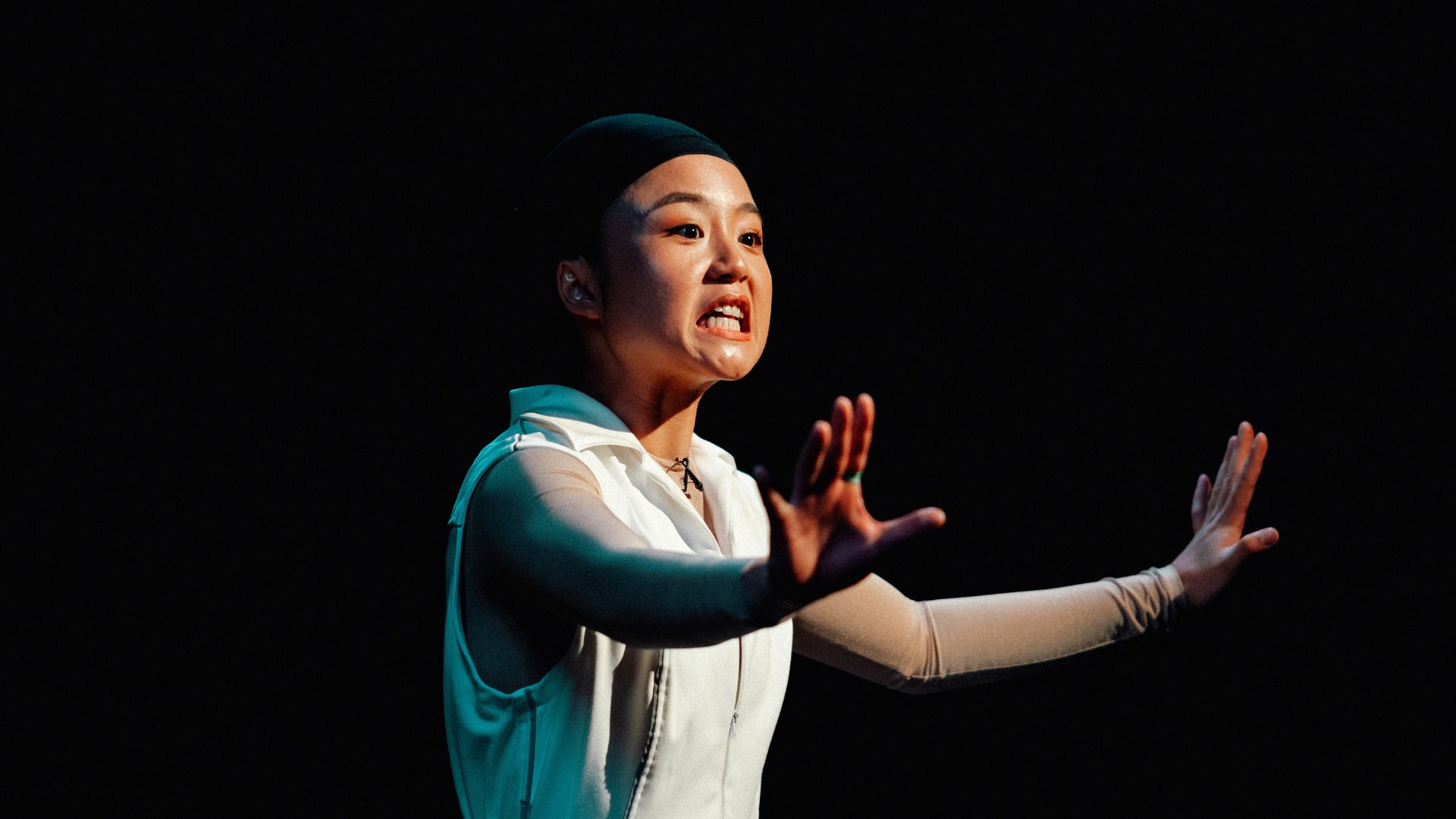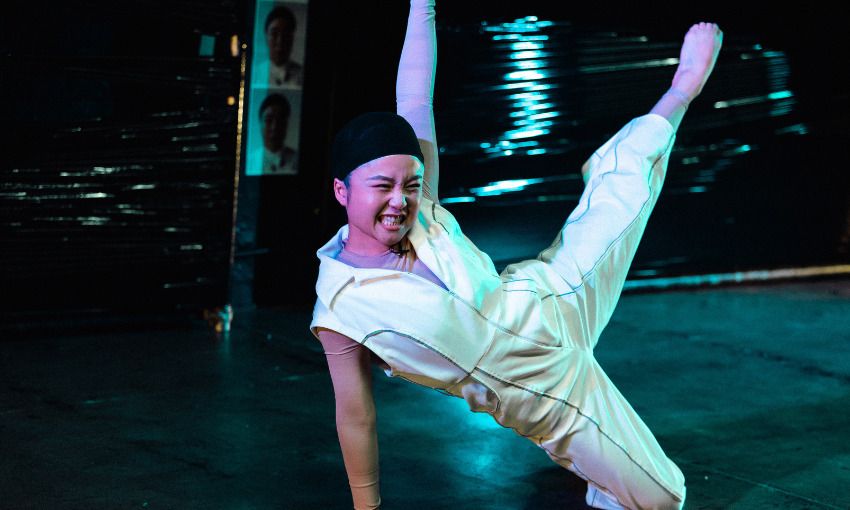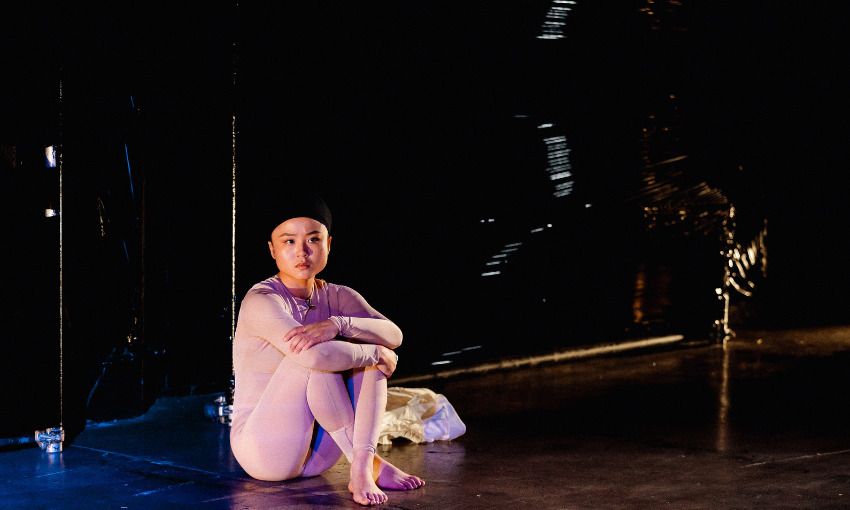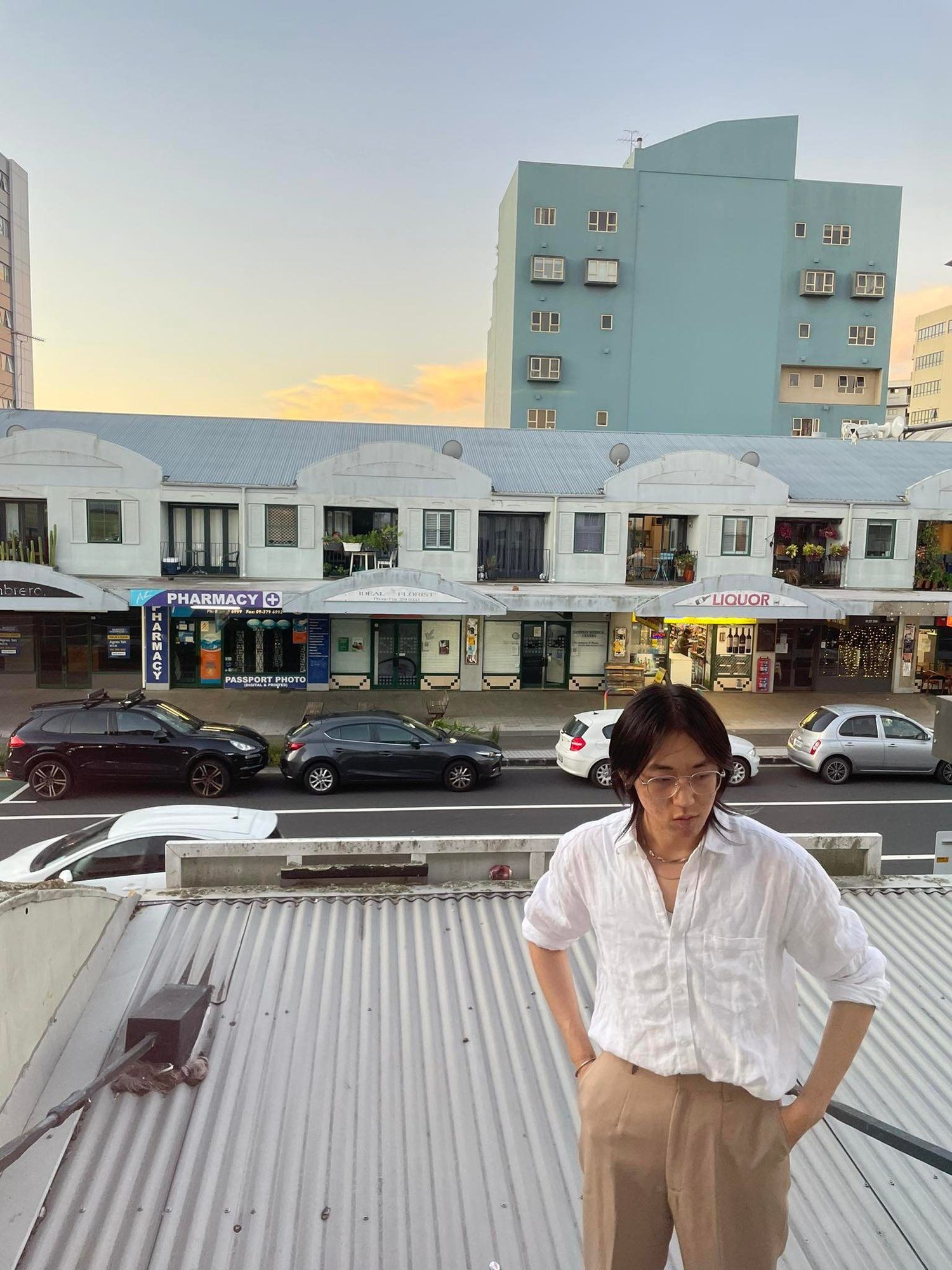Do Androids Dream of Work While They Sleep?
Arela Jiang 姜美淳 connects with Louise Jiang, the very human creator of one-person show Actor//Android, exploring what it means to implode from burnout.
I’m late to my interview with Louise Jiang. Not late, technically – I’m actually seven minutes early to our 8.30am coffee meet-up. She’s already seated at a table with an oat chai latté in her hands. Later, she tells me that she’s gotten into early-morning rises. Stops working around 5pm. Gets two or three hours of productivity in the morning. “Maybe I’m remaking myself,” she confesses. Now that I think back, it’s a bit ominous given who she’s playing in her one-person show Actor//Android: the AI Seven, an evolving android and a productivity powerhouse in a white jumpsuit and a green laser-light finger.
Louise herself is so human in comparison. She swallows up each question carefully, pausing briefly to consider before giving a well-chewed-over answer that should not be that introspective and cerebral for someone awake that early. At first, I assumed that she’s someone who doesn’t come to early-morning chats to dick around. It’s that quiet intensity she has – the cool, calm and collected 姐姐-at-the-Chinese-Association-event energy that slightly intimidates you – until the topic of Lady Gaga comes up and that all dissolves away. She’s warm, gracious and doesn’t shy away from anything. We break the ice comparing last names: 姜 vs 江. And from robots drinking coffee, to capitalism, to Alien Covenant, she follows my gearshifts in the conversation with a good-natured patience.
We break the ice comparing last names: 姜 vs 江.
So consider me a bit freaked out when I see her for the first time as Seven – outrageous, violent, and a bit manic – stabbing her way onto the stage. We see her audition for roles over and over as she carries out her crusade of performance-industry domination without missing a beat. She’s terrifying and terrifyingly charismatic. It’s clear from the get-go that Seven is a force not to be fucked with and she knows it. “It’s kind of like software updates,” Louise explains at our pre-show coffee chat, “the seventh model of the android is the most advanced so far. And with every advancement, she gets a little closer to human qualities. I would say the strongest human quality she has is her ego, which at times forces her to walk a little close to the sun.”
Louise Jiang as Seven (Photography: Julie Zhu)
Seven doesn’t just walk, she struts, crawls and cartwheels increasingly closer to that edge. In a truly great bit of physical comedy (read: slaughtering French citizens), we witness Seven taking a metaphorical blowtorch to her own wax wings as that human ego gets the better of her. She starts bombing auditions, and it’s not long before she’s begun her rapid nosedive towards her own termination. Right till the end, Seven relishes her performances, even when she knows she’s working lifeline to lifeline. She’s all work and that’s her play. Louise created Seven when she’d just gotten her step into the acting industry as a student – she tells me she caught a glimpse of what it takes to make it and survive in this highly competitive world. “I like to think of her as an alter ego of all of us,” explains Louise. “I thought to myself, okay, well, what if I just removed all the human qualities that might set me back: shame, shyness, self-deprecation. We all entertain those intrusive thoughts of ‘What if I was just 100% better?’”
I squirm, seeing myself in Seven: that law student who puts “loves academic writing” as an interest on my CV, who finishes up writing this review during a job-recruitment Zoom event, a preacher of work–life balance without actually practising it. Sure, I’m a burnout baby – but ain’t that just the world we live in? “The show starts off with the premise that burnout is not sustainable,” Louise begins. “It’s not a good thing.” She sees the Android not as a perfect creation, but more of a reflection of its maker: “it has all their perks and all their flaws, and their ideologies about being the best possible successful product of life.”
Sure, I’m a burnout baby – but ain’t that just the world we live in?
But Louise also saw different aspects of burnout as important references for the show. “I think the art you make on the precipice of burnout is so interesting because your sense of boundaries goes down.” She adds, “What you make ends up kind of strange, and so close to those internal formulas. So things are going to get weird.”
Louise didn’t need to tell me twice; just from the number of Lady Gaga songs she’s managed to slip in, I knew that this show was a full commitment to camp. She’s a dog in one scene and a bitch (to work with) in the next. And give that girl a Grammy for best duo performance for Shallow (ft Roomba)because who the fuck does that? When she pokes fun at the audience, we go wild being the butt of her joke – we’re so captured by her cockiness. Louise’s comedic timing is effortless and Seven burns brightest when she’s at her silliest.
"the art you make on the precipice of burnout is so interesting because your sense of boundaries goes down"
However, in the moments when the play slows down is where it falters – in the moments of stillness when Seven’s façade slips and the audience gets to see the human beneath. In the final act, we see Seven stripped of her bravado, at her most human and facing the fatal consequences of her burnout. She is her own funeral procession as she drags herself to her final resting place. “I’m scared,” she repeats, her words echoing across the empty stage. The silence is deafening – except that it isn’t, as giggles erupt from the audience. I can’t help but find something disturbing in the audience’s response – do they see this moment as a continuation of the comedy? Or is it more the nervous chucklers in the room – faced with death by overwork played out before them. I don’t know how to feel, and I don’t think rest of the audience knows either. But then the moment passes and everything is ‘all go’ again.
Louise Jiang as Seven (Photography: Julie Zhu)
For Louise, she intended to challenge the audience in these moments of stillness: “Where are the moments of stillness, and how comfortable are we [with them]? … It’s really easy to go at breakneck speed. We have a hunger for heart, and an obsession with high speed, but how comfortable are we when things don’t happen? And how much louder is the silence when we live in a constant bubble of information, of voices, of embarrassment, of internal pressures?” I have to wonder if someone who hadn’t had this conversation with Louise would have felt the same weight of these silences as I did. Even with these pre-show messages in mind, I struggled to fully connect with this thread.
The show is playing with these very big, very now themes that require space for the audience to unpack – make the show a comedy and you’re faced with juggling the mirth with the meta. Actor//Android doesn’t quite get the balance right. You can feel that these moments are there to allow the audience to inhale reality, pause, and sober up. But these pauses are too few and fleeting to allow for the exhale. The show has so much potential for more in these moments, though, so I’ll hold my breath.
How much louder is the silence when we live in a constant bubble of information, of voices, of embarrassment, of internal pressures?
But maybe that’s the burnout survivor in me. Louise made sure to tell me that we shouldn’t feel the need to take the show too seriously, because the show itself isn’t. “There are questions that we excavate in the process of the show,” says Louise. “The show can be two things. I’ve had audiences come and just enjoy the dancing and the jokes and the humor in it as a satire. And I’ve also had people come [for those questions].” The play is intended to be an opportunity for reflection but not necessarily a cautionary tale. “I think the audience will take away what they will take away. Without trying to prescribe what to take home, I think one of the questions is: What are my needs? As humans, a lot of us have the privilege to live a full or holistic life. We need to go back to our Maslow’s triangle. What is the base of that? What do you need? If we’re humans, and we’re not robots, then I think we should make the most of it.”
ACTOR//ANDROID ran at The Basement Theatre from 07-11 March



